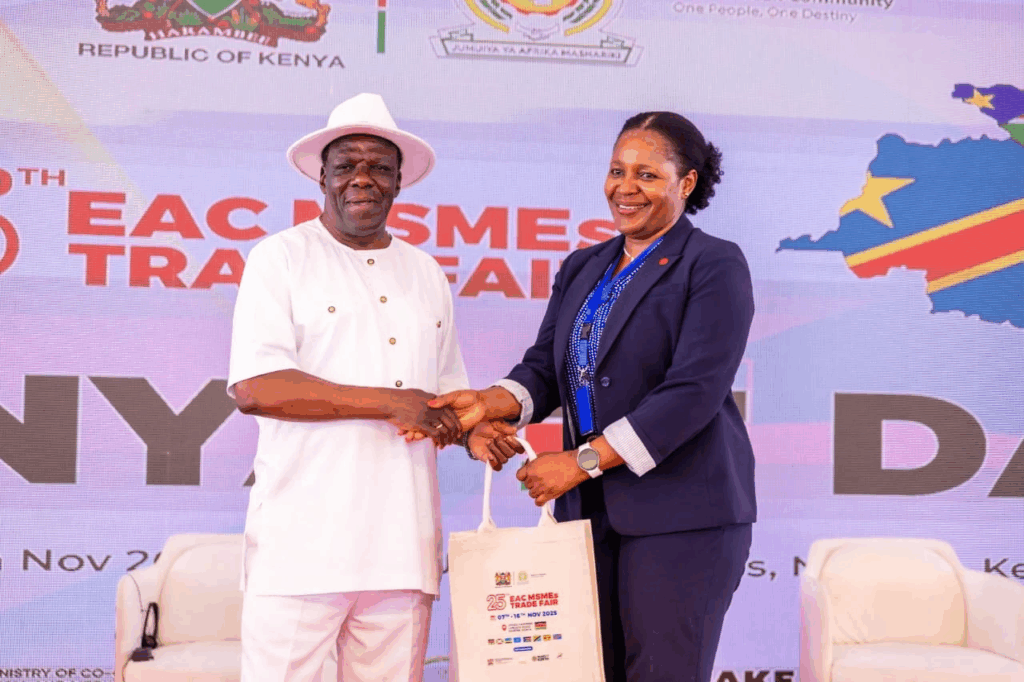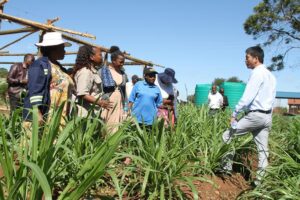Absa Bank Calls for Direct Support to Empower East Africa’s Small Businesses
The panel went on to discuss the integration of MSMEs into larger corporate value chains and the adoption of digital platforms to reach wider markets.

This was one of the key messages expressed during a panel session at the 25th EAC MSMEs Trade Fair, which took place from November 10–11, 2025, at Uhuru Gardens in Nairobi. Photo/courtesy
By Ruth Sang
Absa Bank Kenya has reiterated that unlocking the full potential of MSMEs in East Africa requires taking financial services and business support to entrepreneurs, rather than waiting for them to approach banks. This was one of the key messages expressed during a panel session at the 25th EAC MSMEs Trade Fair, which took place from November 10–11, 2025, at Uhuru Gardens in Nairobi. The session, titled “Unlocking Access to Finance and Markets: Key Enablers for Scaling MSMEs in the Region,” brought together policymakers, business leaders, and financial institutions to explore sustainable ways of strengthening the MSME ecosystem.
The trade fair was organized under the theme “25 Years of EAC Integration: Advancing Innovation and Regional Value Chains for Competitive MSMEs Towards Sustainable Development” to showcase regional progress on the promotion of entrepreneurship and cross-border trade. Addressing the gathering, Cabinet Secretary Wycliffe Oparanya observed that the event’s aims were in tandem with Kenya’s Bottom-Up Economic Transformation Agenda-BETA, aimed at propelling small enterprises as engines of inclusive growth.
“MSMEs contribute nearly 30 percent to Kenya’s GDP and account for over 90 percent of employment,” Oparanya said, lauding the participation of more than 3,000 exhibitors from across the East African region. He, however, cautioned that many small businesses continue to struggle with limited access to markets, inadequate financing and challenges brought about by climate change.
Representing the banking segment, Elizabeth Wasunna-Ochwa, Director Business Banking, Absa Bank Kenya, outlined how the lender had started using a different tack to serve small businesses better. “What we are doing differently is taking conversations to where SMEs are — in the fields and marketplaces — instead of waiting for them to visit our branches,” she observed.
Wasunna said Absa was promoting two key changes: increasing unsecured lending using credit guarantee schemes to reduce the risks in lending, and more non-financial support like mentorship, training, and business advisory services. “Sustainable SME growth requires both financial and non-financial support. We must walk with entrepreneurs on their journey toward becoming the corporates of tomorrow,” she added.
The panel went on to discuss the integration of MSMEs into larger corporate value chains and the adoption of digital platforms to reach wider markets. Among several examples of regional efforts, Burundi’s strategy for e-commerce at the national level showed how technology can extend cross-border trade and add competitiveness.
This year’s EAC MSMEs Trade Fair was co-organized with the International Trade Centre (ITC) and included a High-Level Ministerial Roundtable on promoting innovation and entrepreneurship among the youth. The deliberations will culminate in a communiqué that will be presented at the next EAC Heads of State Summit, calling for increased policy and financial support for MSME growth across the region.
The Kenya Day celebration at the fair was graced by several dignitaries, among them AfCFTA Secretary General H.E. Wamkele Mene, ITC Executive Director Pamela Coke-Hamilton, and UN Resident Coordinator Stephen Jackson. Others were Cabinet Secretary Mercy Wanjau, PS Regina Ombam (Trade), and PS Patrick Kilemi (Cooperatives); representatives from key financial institutions and state agencies such as MSEA, Kenya Bankers Association, Uwezo Fund, and Financial Inclusion Fund also attended. Their collective message was reinforcing one and the same thing: to achieve economic transformation for East Africa, MSMEs needed capital but needed equally importantly networks, technology, and mentorship to build sustainable, competitive businesses in a regional and global context.







